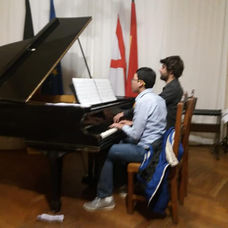
Sucre, Bolivia
MUSIC CONSERVATORY

INTRODUCTION
The city of Sucre recognizes the need for high-quality academic institutions in artistic education with the aim of training professional musicians of exceptional caliber. This endeavor is seen as having significant cultural impact on society, especially given the city's rich cultural heritage. Additionally, it provides opportunities for young talents, contributes to the city's tourism potential, keeps pace with the evolving cultural landscape, and offers employment prospects in the artistic domain.
Following a gathering of local artists in Sucre where various artistic sectors expressed their needs, pianists Beatrice and Francesco were approached by musician Alvaro Monroy to establish a music conservatory. They were asked to contribute to the development of professional music education within an academic framework, offering their unique perspective and experience in music and pedagogy. Importantly, they aimed to maintain a neutral stance concerning the existing local realities and dynamics.
HISTORY OF THE CONSERVATORY
Beatrice and Francesco relocated to Sucre in 2017, engaging with numerous local entities in the music sphere to understand and analyze the context, study relevant laws, and create a conservatory that could conform to international conservatory standards while respecting the local context.
In February 2018, the first academic year of the Conservatorio Internacional de Música commenced within the facilities of the Universidad San Francisco Xavier de Chuquisaca. The Conservatory established an international faculty that worked both remotely and in-person and was responsible for training on-site assistants who could become future faculty members. The project was designed to provide high-quality education, relying on well-trained and experienced instructors, with the goal of becoming increasingly self-sufficient over time.
Throughout the 2018 academic year, the Conservatory welcomed over a hundred students and collaborated with numerous institutions to create projects and events in the city, such as the MUYU Project, Festival Internacional de la Cultura - Sucre, Festival del Sol - El Alto, Conservatorio Plurinacional de la Paz, Bolivia Joven - Oruro, and the Secretaría de Cultura de Sucre.
However, following the end of the academic year, there was a change in the university's administration in November 2018, resulting in a shift in attitudes towards the Conservatory and its continuation for the following academic year.
In May 2019, with the support of all the students, Beatrice and Francesco declared their departure from the university due to a lack of response and declared themselves an independent and self-sustaining music education entity (the Conservatory receives no financial support from foundations or organizations).
During the 2019 academic year, the Conservatory received logistical support from Musikal Sucre, the German-language cultural center, Alliance Française, the American cultural center, and La Guarida cultural center, maintaining a student body of nearly one hundred.
Meanwhile, the Conservatory pursued recognition as an educational institution and accreditation from the Ministry of Education of the Plurinational State of Bolivia. However, political events at the end of 2019 and in 2020 slowed down the recognition process.
To meet the Ministry's requirements, an edifice was rented and made suitable for classes, which were held there until March 2020 when the COVID-19 pandemic necessitated a transition to complete virtual instruction.
Currently, the Conservatory collaborates with the IPTK Foundation (Instituto Politecnico Tomas Katari), which has been active for decades in societal and diversity projects, including the establishment of educational institutions, hospitals, and social projects. The Conservatory is now part of a comprehensive university project with the IPTK Foundation, which is awaiting approval from the Bolivian Ministry of Education.
Simultaneously, efforts are being made to establish agreements with European institutions or conservatories that can provide certificates or degrees that would allow Bolivian students to study and work worldwide. Currently, the Bolivian diploma is not recognized by most countries due to the absence of agreements between Bolivia and other nations in the field of artistic education.
FACULTY AND ASSISTANTS
Faculty Members:
• Beatrice Lupi: Foundation, Academic Direction, Piano, Music Theory, Ear Training, Harmony, Choir, Accompaniment, Chamber Music (since 2017)
• Francesco Paganini: Foundation, Direction, Piano, Music History, Harmony, Acoustics, Choir, Accompaniment, Chamber Music (since 2017)
• Adele Posani: Foundation Conservatory, Flute (since 2017, Italy-Palestine)
• Aidan Pentinople: Foundation Conservatory, Violin, Viola (2017-2018, Canada-Palestine)
• Valentina Londino: Voice (since 2018, Switzerland)
• Giulia Alessio: Violin, Viola (since 2019, Italy)
• Simone Rinaldo: Guitar (since 2020, Italy)
• Janet Rodriguez Pino: Percussion (since 2019, Cuba)
• Juan Manuel Bernal Jiménez: Voice (since 2021, Colombia)
• Alfredo Alejandro Supino: Double Bass (2021-2022, Venezuela-Switzerland)
• Silvano Hernandez: Trumpet (2019-2021, Cuba)
• Pedro Lopez de la Osa: Guitar (2019, Spain-United States)
• Kerem Brera: Cello (2020, Italy)
• Pedro Barrios: Double Bass (2019, Bolivia)
• Vivian Hidalgo: Saxophone, Clarinet (2019, Cuba)
• Virginia Chiara Lucioli: Violin, Viola (2018, Italy)
• Gregorio di Trapani: Percussion (2018, Italy)
• Viola Cartoni Mancinelli: Complementary Piano (2018, Italy)
• Arthur Marden: Accompaniment for Singers (2018, Brazil)
Assistants:
• Carlos Zegada Raya: Percussion (since 2018)
• Marcos Calizaya: Guitar (2020)
• Rodrigo Alcoreza: Voice (since 2019)
• Claudia Nava: Reading for Singers (2020)
• Susana Cervantes: Voice (2020)
• Arpad Debreczeni: Violin (2020, Bolivia)
• Claudia Sanchez: Voice (2019)
• Carla Escobar: Piano (2019)
• Sergio Llanque: Piano, Music Theory (2022)
• Pablo Arce: Music Theory (2021-2022)
• Jonathan Caba: Music History (2021)

























